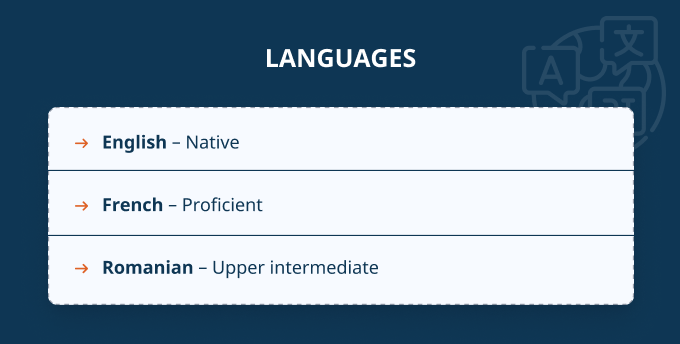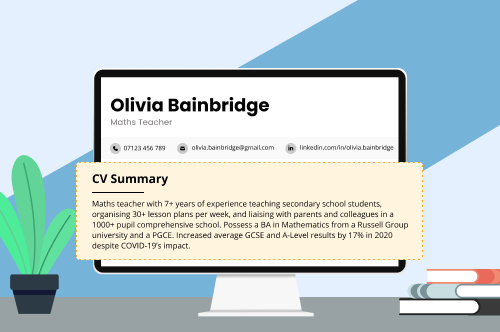Speaking a foreign language is a valuable skill for your CV and can help you stand out from other applicants.
The ability to communicate in multiple languages is a highly sought-after skill in the UK — where only one-in-three people report knowing one or more foreign languages.
Foreign language skills enable you to communicate better with international clients and team members, which is valuable across industries.
Languages also broaden your cultural knowledge, helping you to develop crucial interpersonal skills like empathy and active listening.
That said, how to write a great CV that showcases your language skills effectively depends on several factors, including your language proficiency level and the job you’re applying for.
How to put language skills on your CV
There are several ways to highlight your language skills on your CV. Which method you should use depends on how relevant your language skills are to the specific job and how well you know the language.
You can add your language skills to:
- your personal statement
- a dedicated languages section
- your skills section
- your hobbies and interests
1. Inserting language skills into your personal statement
Only include a language in your personal statement (also called a CV profile) if they’re essential to the role and you know the language very well.
For example, you’re a bilingual Japanese speaker and are applying for a Japanese business interpreter position:
Attentive bilingual Japanese speaker with 5+ years of experience in business interpretation. Proven ability to accurately interpret complex dialogues at meetings, conferences, and public events. Seeking to bring my knowledge of local values and business etiquette to the Japanese business interpreter role at InterPefect.
2. Creating a dedicated languages section
If you want to emphasise your foreign language skills, but they aren’t a key requirement for the job, list them in separate language sections.
Here’s how a languages section looks when properly formatted:
Creating a separate language section is particularly useful if you speak multiple foreign languages. By giving your language skills their own space on your CV, you make them stand out to the employer.
Usually, your languages section appears towards the end of your CV. Positioning it in this way allows you to focus on your other skills and experiences in the body of your CV.
Good CV builders will offer you the opportunity to create a dedicated languages section.
3. Including languages in your skills section
You can also add languages to your skills section as you would any other skill.
Here’s an example skills section that includes foreign language skills:
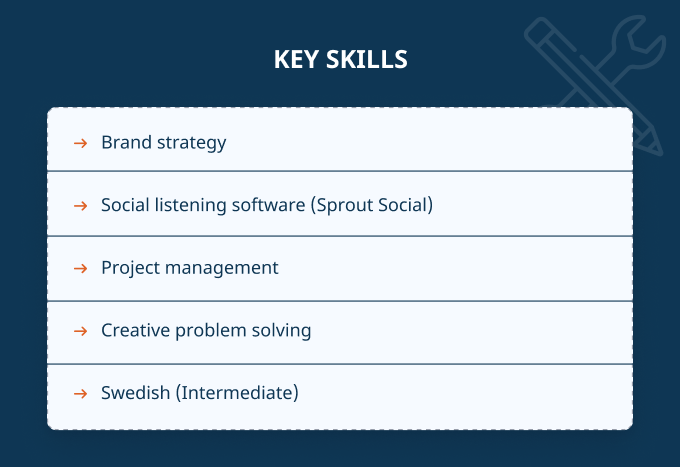
Adding a language to your skills section is advisable when the language isn’t essential to the position.
By working your language skills into your skills section, you make them less visible to the employer. At the same time, you save space on your CV — which is especially helpful if you’re writing a one-page CV — that you can use to emphasise other, more relevant abilities.
Consider how important your language skills will be in this specific instance before deciding where to put them on your CV.
4. Adding language skills to your hobbies and interests section
Add your language skills to your hobbies and interests section if they aren’t relevant to the job you are applying for.
Your hobbies and interests section is the last part of your CV that the employer looks at, but it’s still influential. Employers look at your hobbies and interests to understand what kind of person you are beyond your professional skills and experience.
Speaking a foreign language indicates that you possess cultural sensitivity, strong communication skills, and other qualities that make you a great team player.

How to describe your language skills on your CV
When adding a language to your CV, it’s important to clarify your skill level to help find the right job opportunities.
For example, an employer for a Russian Medical Translator role will only be interested in applicants who have impeccable Russian skills. If you’ve just put “Russian” in your key skills, the employer won’t know if you’re a capable Russian translator or a beginner in the language — and they might move on to the next applicant as a result.
There are a couple of ways you can clarify your language proficiency level and avoid being overlooked:
1. Use a language proficiency scale
A language proficiency scale is a standardised framework for measuring and describing language ability.
The Common European Framework of Reference for Languages (CEFR) is the most widely recognised proficiency scale in the UK and Europe. The system weighs language ability on a six-point scale, with proficiency levels ranging from A1 (beginner) to C2 (proficient).
Here’s an overview of the CEFR levels and what they mean:
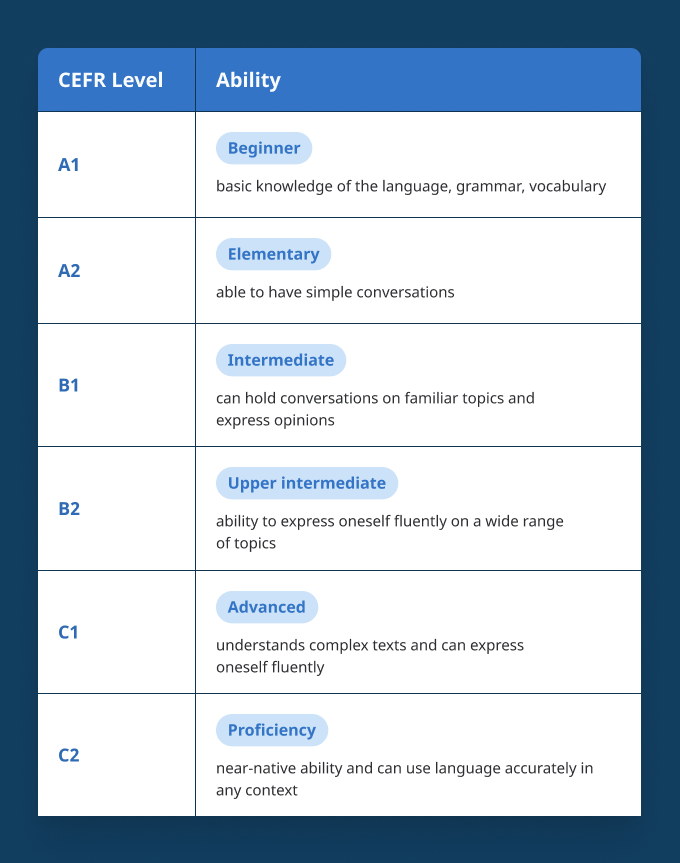
Including your CEFR level on your CV is one of the clearest ways to describe your language proficiency to employers, as it gives them an immediate point of reference for understanding how well you speak the language.
If you have certified your language level with a recognised exam, you can also include it on your CV. Language certificates validate your language ability and add value to your CV.
Here are some well-known language exams that use the CEFR framework:
- The European Language Certificates (TELC)
- DAF German Diplomas
- DELE Spanish Diplomas
- DELF French Studies Diplomas
And here’s how to format a language certificate on your CV:
- French: DELF C2 (Proficient)
- German: DAF B2 (Upper Intermediate)
- Spanish: DELE B1 (Intermediate)
2. Describe your language skills in your own words
If you’re applying for a job outside of the UK and Europe (or in an industry where employers are unlikely to be familiar with CEFR), describe your language proficiency using specific terms.
These are some of the most common terms used to describe language proficiency
- Native-level, proficient – You can communicate fluently and accurately in any situation, express complex ideas, and use technical language
- Fluent – You can have natural conversations and express complex opinions without help, but you may have limited vocabulary when talking about certain technical topics
- Intermediate/limited working proficiency – You can express opinions, talk about familiar subjects, send emails and communicate with coworkers, though with limited grammar and vocabulary
- Beginner – You can talk about familiar topics and express simple ideas
If you’re applying for a job in an industry where more creative CV designs are appropriate, you can also use graphics to represent language proficiency:
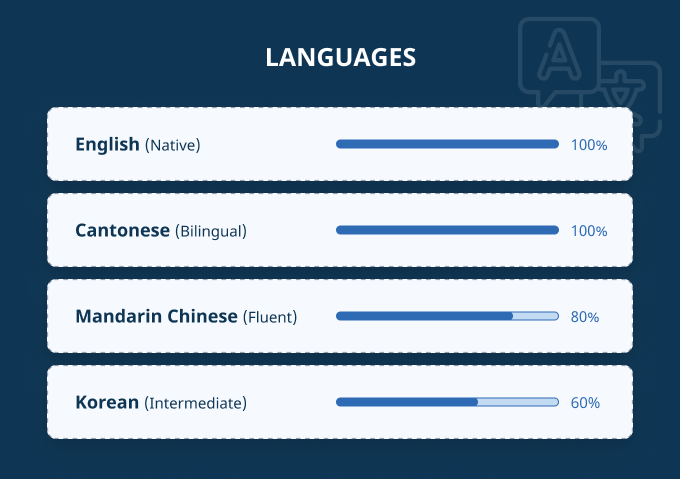
If you use a graphic to represent your language skills, make sure the design is clear and easy for the employer to skim.
Frequently asked questions about language skills
Here are answers to three of the most common CV questions asked about language skills on CVs:
1. What language skills are most important?
Which language skills are most important for your application depends on the job you’re applying for.
You should check whether knowing a language is a key requirement by reviewing the job description. If knowledge of a language that you speak is a requirement then highlight that language in your CV.
You can highlight important language skills in:
- your personal statement
- a separate languages section
- your key skills section
Remember that where on your CV you decide to include your language skills will influence how likely the employer is to notice them.
Including language skills high up on your CV or in a separate section will make them more visible but also takes up space that you could use to showcase other valuable skills.
Think about how important the language is to the job you’re applying for, and list the language in an appropriate section.
2. How do you write language level on a CV?
There are several ways to represent how well you know a language on your CV. To write what your language level is in your own words, you can use one of the following terms:
- Advanced: Proficient, fluent, native-level, bilingual, native, mother tongue, upper intermediate, full professional proficiency
- Mid-level: Intermediate, working proficiency, professional proficiency, conversationally fluent, limited-working proficiency, written proficient
- Beginner: Elementary proficiency, basic-working knowledge, pre-intermediate, fundamental, introductory knowledge
Remember that the language-level terms in this list don’t all mean the same thing. For example, being proficient in a language is not the same as being fluent in it. Proficiency means that you have complete mastery of a language. In contrast, fluency is the ability to speak with ease in any situation, though you might sometimes have limited vocabulary.
Check that the terms you use to write your language level accurately reflect your ability in that language.
3. What is my language proficiency?
The best way of finding out your level of language proficiency is to take a language proficiency exam that uses a recognised language proficiency framework.
In the UK and Europe, the most widely recognised language framework is the CEFR, which measures language ability along a six-point scale:
- A1: Beginner
- A2: Elementary
- B1: Intermediate
- B2: Upper intermediate
- C1: Advanced
- C2: Proficient
You can determine your CEFR level on your own using a self-assessment grid or certify it by taking an official language exam that uses the CEFR framework, such as the DELE Spanish Diploma exams. Language certifications lend credibility to your language skills and make a valuable addition to most CVs.
More resources about skills you can include on your CV
Here are more resources to assist you as you seek a rewarding new career:
- The Best Technical Skills for a CV in 2024
- In-demand IT Skills for 2024
- 83+ Hard Skills and How to Add Them to your CV
If that’s a bit overwhelming, consider using a CV maker instead. The AI-powered software will create you a full UK-length CV in just a few minutes, ready to be emailed to recruiting managers.

